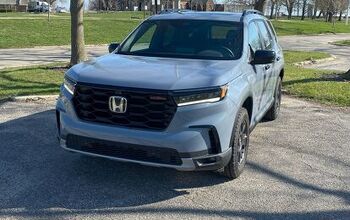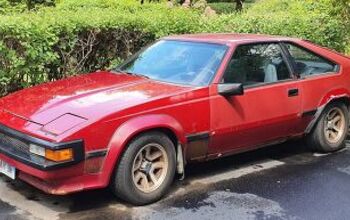Your Love for Trucks Has Average Transaction Prices Beating Inflation

All that leg-stretching, snot-nosed kid-hauling, hockey equipment-carrying, ATV-lugging space that new vehicle buyers so desperately crave comes at a premium.
Thanks to this insatiable thirst for crossovers, SUVs, and pickups, the average new vehicle transaction price jumped to a new record in 2016. Good news for manufacturers, but also for those selling their old ride.
According to Edmunds, the average transaction price for a new vehicle hit $34,077 this year. That’s a 2.7-percent rise over last year’s average. In the past five years, the amount shelled out by an average buyer rose 12.6 percent, a boost fueled by the rapid shift towards pricier utility vehicles.
Compare that figure with the country’s 2016 inflation rate of 1.7 percent.
The market’s abandonment of traditional passenger cars, coupled with the popularity of leasing, means we’ll likely see the trend continue. Edmunds predicts transaction prices to average $35,000 in 2017. Leasing, which currently represents 31 percent of new vehicle transactions, should grow in the new year.
The days of sensible sedans and station wagons ruling America’s roads are over. No longer does a higher-trim version of your existing sedan — LTD, anyone? — or personal luxury coupe represent the aspirations of most car buyers. This year, light trucks gobbled up 62 percent of the market.
While building vehicles capable of hauling five people and a lot of cargo has proved a gold mine for automakers (well, except Fiat), the rise of utility vehicle dominance hasn’t just affected new vehicle prices. In many cases, it has made the hunt for used vehicles more difficult.
“The flip side of this trend is that higher prices are putting a bit of a squeeze on the market for lower-cost, used vehicles,” said Jessica Caldwell, Edmunds executive director of industry analysis. “Our data shows that more people are looking for affordable older vehicles than are actually sold, driving up values and demand.”
Of course, buyers can avoid this by seeking out unpopular models that won’t move off the pre-owned lot.
[Image: Ford Motor Company]

More by Steph Willems
Latest Car Reviews
Read moreLatest Product Reviews
Read moreRecent Comments
- Brian Uchida Laguna Seca, corkscrew, (drying track off in rental car prior to Superbike test session), at speed - turn 9 big Willow Springs racing a motorcycle,- at greater speed (but riding shotgun) - The Carrousel at Sears Point in a 1981 PA9 Osella 2 litre FIA racer with Eddie Lawson at the wheel! (apologies for not being brief!)
- Mister It wasn't helped any by the horrible fuel economy for what it was... something like 22mpg city, iirc.
- Lorenzo I shop for all-season tires that have good wet and dry pavement grip and use them year-round. Nothing works on black ice, and I stopped driving in snow long ago - I'll wait until the streets and highways are plowed, when all-seasons are good enough. After all, I don't live in Canada or deep in the snow zone.
- FormerFF I’m in Atlanta. The summers go on in April and come off in October. I have a Cayman that stays on summer tires year round and gets driven on winter days when the temperature gets above 45 F and it’s dry, which is usually at least once a week.
- Kwik_Shift_Pro4X I've never driven anything that would justify having summer tires.


































Comments
Join the conversation
If you accept the idea that prices are largely based on the actual value that purchase represents then it's not surprising that transaction prices are increasing. Late-model vehicles offer more power, comfort, reliability, entertainment, efficiency, and safety than their contemporaries from even 5 years ago. Of course people are willing to pay more for them.
Eventually the sales of full size pickups and suvs will peak and go down. There is a limit to how long cheap or no interest loans will be around with the Federal Reserve raising rates. There is also a limit to how long cheaper energy prices will exist even with more reserves of oil being found. Below a certain price it does not pay to produce oil and with OPEC and other producers restricting production there will be a limit to how much oil will be available. Another major conflict in the Middle East or a pipeline rupture can cause an interruption in supply and an increase in price. An economic downturn which will eventually happen will cause lower demand for full size trucks and suvs. Economies go up and down and then go up and down again. Nothing lasts forever. Also things go in cycles and what is popular now will not necessarily be popular in 10 years. Large sedans and station wagons were popular in the 70's, then smaller cars and mini-vans, and now pickups, crossovers, and suvs. Even though pickups and large suvs are selling well they are not selling at the same rate they were sell at pre-2008. Everything goes in cycles.